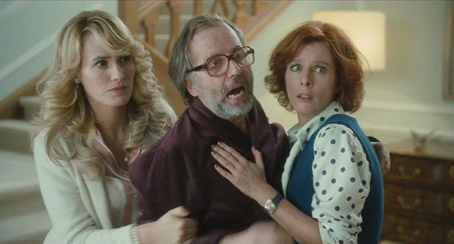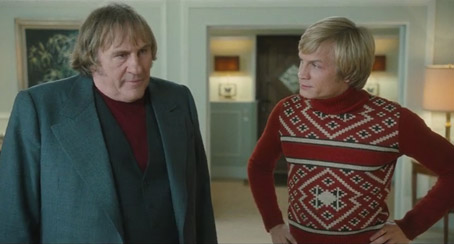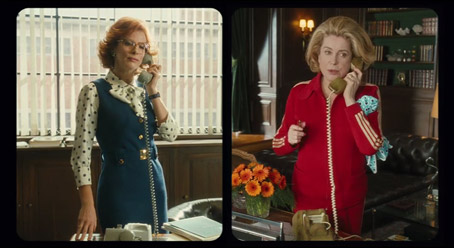|
Just occasionally there's a suspicion that François Ozon is actually two filmmakers masquerading as one. There's the serious storyteller of mystery dramas like Swimming Pool, Under the Sand or the deeply moving Time to Leave, and the more playful creator of works such as the satirical Sitcom and the musical comedy 8 Women. His most recent film, Potiche, definitely falls into the second camp, a jovial comedy with a satirical bent and a female empowerment message, one that unites two of the giants of French cinema. And in the case of one of them, I have to be careful about how I use the term giant.
A potiche, as every review on the face of the planet will probably tell you (as it should), is a French term for trophy wife. For those who have never come across this particular expression, Wikipedia succinctly describes it as one used "to describe a wife, usually young and attractive, who is regarded as a status symbol for the husband, who is often older and affluent." The potiche here is Suzanne Pujol (Catherine Deneuve), whose husband Robert (Fabrice Luchini) runs an umbrella factory that was founded by Suzanne's father, a company whose industrial troubles are playing merry hell with Robert's heart condition. The problem for Suzanne is not just that Robert treats her as a trophy wife, but that he expects her to accept this role and act accordingly. Attempting to express her view on her son's new girlfriend, she is quickly snapped into place by Robert, who reminds her sharply that when it comes to opinions, "all I ask is that you share mine" and that "anything else is a waste of words and energy." It's a frustrating existence that isn't exactly helped by a cheerful proclamation from her daughter Joëlle (Judith Godrèche) that she's planning to divorce her husband because she doesn't want to become a potiche like her mum.

When the factory dispute takes a turn for the worse, Robert storms off to confront the workers and after fighting with the foreman is effectively taken hostage. "Have the workers got machine guns?" asks Suzanne's young grandson Flavien, as Joëlle's liberal and artistically minded brother Laurent (Jérémie Renier) unsuccessfully offers to trade places with his father. He returns a short while later in a disheveled state after being attacked by a still furious Robert. "Luckily the picket line was there to contain him," Laurent remarks in a daze. Suzanne takes charge and nips out to pay a visit to the town's Communist mayor Maurice Babin (Gérard Depardieu) – a man with whom she once had a fling – to request his assistance in negotiating her husband's release. Maurice obliges and Robert is set free, but the very next day he is confronted about his misuse of company funds for personal luxuries and suffers a seizure. His doctor orders rest, but who will take over running the factory in his absence? Maurice suggests Suzanne and everybody laughs, but with neither Joëlle nor Laurent willing to take up the reigns, Robert agrees, advising her to just keep things ticking over in his absence. But Suzanne has her own ideas on how to settle the dispute and get the company back on track.
The 70s setting not only grounds Robert's chauvinism in social reality, it encourages us to mock its absurdity and regard Suzanne's flowering in her new position of authority as a progressive step. Adopting an open and caring management style, she quickly looks for ways to develop the company and brings her two children on board to help her, but with mixed results. While Laurent's new designs look set to expand the company's range and customer base, the more conservative Joëlle and her like-minded husband compile a report that proposes redundancies and a relocation to Tunisia. By the time Robert returns, Suzanne not only has the factory running sweetly, but enough shareholder support to remain as its boss. But Robert has no intention of becoming a trophy husband, and with the help of his disgruntled daughter sets a plan in motion to unseat Suzanne and put him back in the driving seat.
This is the comedy of appreciative smiles rather than open guffaws (though see it in the company of a sympathetic cinema audience and this can change), one where narrow minded chauvinism is exposed as ridiculous by the progressive forces of liberal reason. Somewhat inevitably, it's not set to last, and once Robert and his ego team up with Joëlle's ambition then the seeds for Suzanne's downfall are effectively sewn, particularly when personal circumstances see her former ally Maurice abandon her cause.

It's here that, for me at least, the film loses some of its previously effortless charm. With the comedy on hold we're asked to engage with the pathos of Suzanne's misfortune, which is fair enough, but the period setting that gives the story its social credibility also ends up blunting its bite. That a woman could be outmanoeuvred in what was then still very much a male dominated world is not in dispute, but thirty years on it's not the potent cry against injustice it would have been at the time in which the film is set. Inequality is still an issue, but management and business ownership is no longer a club with a men only membership – just a couple of years back, almost all managerial positions at my place of work were occupied by women. It probably doesn't help that Suzanne's "warm, fair and human" management style has been coloured by history as the product of retrospective wish-fulfilment, with equality in business too often achieved by women adopting the same ruthless and self-serving attitude as their ghastly male counterparts. Her bounce back from defeat with a successful move into politics also doesn't provide the table-turning pleasure it by all rights should. With her styled hair, clean-cut suit and carefully scripted promises, she can't help but recall the rise to power of Margaret Thatcher, Britain's first female prime minister and a theoretical symbol of liberation and equality, but who effectively declared war on the rights of the ordinary working man and woman and whose legacy is still visible in the rampant greed of the boardrooms of today.
Although now in her 60s, Deneuve is as sprightly and beguiling as ever, at one point singing and dancing to a radio tune like it was Suzanne who once starred in The Umbrellas of Cherbourg rather than the actress who plays her. Her teaming with Gérard Depardieu, that other long-standing icon of French cinema, might seem like a dream ticket, but a distraction to the hints of a rekindled romance is provided by a quite startling increase in Depardieu's girth since the 2006 The Singer [Quand j'étais chanteur]. This is not meant as a criticism of the actor's appearance (he does co-own a respected winery, after all, and lost his eldest son Guillaume to viral pneumonia in 2008), but with flashbacks in which he is shown as a once lithe young man, there's an odd sense that Suzanne has not so much accepted his subsequent expansion as refused to acknowledge it, and that Ozon is asking us to turn a similarly blind eye.
But there's still a good deal of fun to be had in the first two thirds, much of it deriving from the Ozon favourite of complications and conflicts within and around the family unit. The performances are lively without overstepping the mark, and the air of daffy pastiche established in the Disney-esque opening is carried through in the bright interiors and pastel tones of Yorck Le Saux's cod-period cinematography and Philippe Rombi's comically parodic score. It's also hard not to have a soft spot for a film in which young Flavien draws his grandmother a picture of armed terrorists for her birthday, and whose menfolk spend their furtive evenings at a nightclub named Badaboum.
A largely pleasing transfer that effectively captures the warm interiors, pastel leaning palette and subtle period feel that the film had on the big screen. The level of detail is good, but the contrast varies from punchy in daylight to disappointingly washed out in some of the darker scenes, and it's here that the grain is at its most visible. Surprisingly, particularly for a Blu-ray release, the clear English subtitles are non-removable, which is likely to irk those fluent in French.

The DTS-HD Master Audio 5.1 surround track is clear and well balanced, with none of the sudden leaps in volume I've experienced on some HD soundtracks of late – even the bang of fireworks is pitched at just the right level. The frontal separation is subtle but effective, but there's not all that much happening at the rear of the room, save for a few notes of music and some location ambient sound. The Linear PCM stereo track is a less subtle affair with a surprisingly audible treble bias.
OK, before we get to the extras that are included, it's worth having a gripe about one that isn't. The star turn on Music Box Films' American DVD release was a 71 minute 'making of' documentary, which provides an enjoyable and enlightening peeks behind the scenes of the shoot, and its absence here is a bit of a disappointment. But to business.
Outtakes (21:19)
A sizeable collection of outtakes that provides us with the usual pleasures of seeing actors fluff their lines, burst out laughing or fall victim to the misadventures of inanimate objects. The first of Depardieu's giggling fumbles is rather fun, and contrasts with Deneuve's increasing irritation and impatience at her mistakes.
Test Costumes (5:43)
One for fans of 70s fashions, consisting of test footage of the actors parading their outfits under studio lighting.
Teaser Trailer (2:11)
A curious little number that, unlike the release trailers I've seen, is designed in the parodic spirit of the film, complete with mock-serious narration and bubbly yellow lettering that throws words like "Communiste!" diagonally across the screen.
A light-hearted, narratively busy and largely enjoyable pastiche aided by a lively and enigmatic cast and a crew who appear to be very much in sync with Ozon's approach. For me it loses something in the later stages, but that's partly my problem and others have had no issue with this tonal shift. At its best StudioCanal's Blu-ray looks and sounds rather good, but loses points for contrast inconsistency, fixed English subtitles and not including the documentary found on the US release.
|